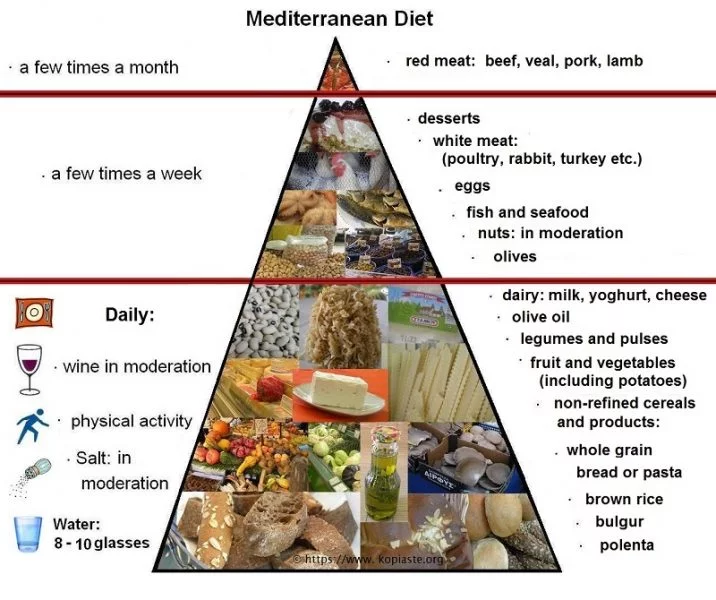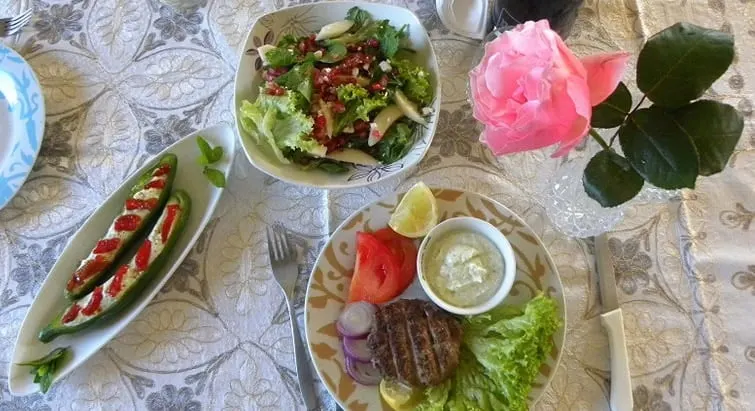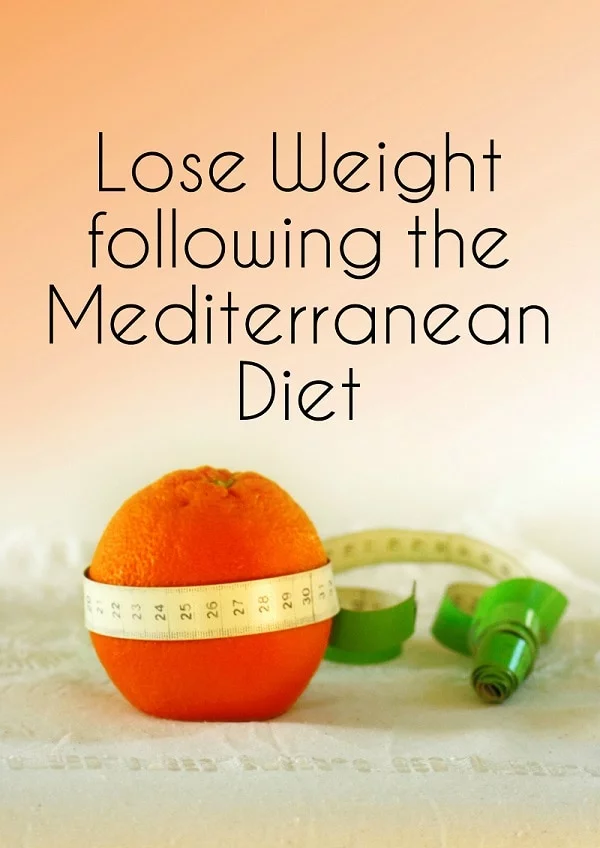You’ve heard me talking about the Mediterranean Diet many times in my posts.
For those of you who are not familiar with this diet, this is the modern nutritional recommendation, inspired by the traditional dietary patterns of Crete which expanded to the remaining parts of Greece and followed by most of the countries of Southern Europe.
The Mediterranean Diet, as it is called, actually is not a diet but it is a lifelong living style, the one our parents used to follow, without being aware of its benefits.
Although our dietary habits have changed significantly during the past years and have been influenced by the western lifestyle, the Mediterranean diet as it is defined below, is followed for health and weight loss by millions of people worldwide. Numerous scientific studies have shown that the Mediterranean diet protects against cardiovascular disease, diabetes and many other chronic diseases, while providing for loss and weight maintenance and good metabolic function.

You can see from the pyramid I made, what to eat. The pyramid is divided into three levels:
The quantity to be consumed depends on age, height, sex and level of activity of each individual. Based on this information we must regulate our calorie intake. The daily meals should be five: breakfast, 10 o’clock snack, lunch, afternoon snack and supper. It is common sense that if we take any amount greater than the calories we need this will increase our weight and less calories will help to reduce weight. For example, if we need 2,000 calories a day, that is where we should stop.Otherwise if we take 2500 calories a day, it doesn’t matter whether these calories are from protein or fat or carbohydrates, then we will gain ½ kilo a week fat or two kilos per month or 24 kilos a year!
The information provided is from the Medical School of the University of Athens who have set some dietary guidelines.They haves a standardized portion size which they call micro-serving and give us the multiples of which are to be consumed. A total of about 22 to 23 servings are to be consumed daily, in four or five meals. In a rough approximation, a serving equals one half of the portions as defined in the Greek market regulations (approximately half the quantity served in a Greek restaurant). So, one serving is equal to:
- one slice of bread (25g)
- 100 g potatoes
- half a cup (i.e. 50-60 g) of cooked rice or pasta
- a cup of raw leafy vegetables or half a cup of other vegetables, cooked or chopped (i.e. ~ 100 g of most vegetables)
- one apple (80 g), one banana (60 g), one orange (100 g), 200 g of melon or watermelon, 30 g of grapes
- one cup of milk or yogurt
- 30 g of cheese
- 1 egg
- ~ 60 g of cooked lean meat or fish
- one cup (i.e. 100 g) of cooked dried beans
Here is what this pyramid means:
The base of the pyramid has food which has to be consumed daily.
The Mediterranean diet emphasizes eating plenty of natural products such as cereals, whole grains, fruits, vegetables, nuts, milk and olive oil as the primary source of fat.

Vegetables: 6 micro-servings per day
Fruit: 3 micro-servings per day
Dairy products: milk, cheese, yogurt 2 micro-servings daily
Olive Oil: main source of fat (2 tablespoons per day)
Red wine: 1 (wine) glass per day for women and 2 for men
Water: 8 – 10 glasses per day
The central part is the food to be eaten a few times a week: white meat and fish and seafood are recommended in moderate amounts. When cooking, salt must be used in moderation and herbs and spices should be used to enhance the flavour.
Fish: 5-6 micro-servings per week
Poultry: 4 micro-servings per week
Potatoes: 3 micro-servings per week
Eggs: 3 micro-servings per week
Olives, legumes, and nuts: 3-4 micro-servings per week
Sweets: 3 micro-servings per week
At the top of the pyramid is red meat, i.e. beef, lamb or pork should be consumed about once every 10 days. Recommended: 4 micro-servings a month.
As you can see, olive oil is an integral part of Greek diet. We are the third largest producers after Spain and Italy but according to statistics of 2005 we are the top consumers: the per capita consumption of olive oil in Greece amounts to 26 liters per person per year. Wikipedia
Οlive oil is the base of the Mediterranean diet, which is regarded to be the exemplar of correct and healthy diet and a factor of longevity. As much as olive oil may have substantial properties, we must not forget that it is rich in calories: 10 g has 90 calories οr 1 tbsp = 119 calories. Our parents used it generously, but they did not have the means to cook in a healthy way. Rather than frying food we can get a non-stick cookware and significantly reduce the amount of olive oil use and it is much better when we cook to add some uncooked olive oil on top. A teaspoon of olive oil once a day is enough to supply the nourishment that you might need and thus get from this humble kitchen oil.
Disclaimer: I am not a dietitian or health care professional. My posts reflect my own personal experience. I have visited a lot of dietitians in the past, so I have learned what to eat and what not to eat. However, you should always consult a doctor before making any changes to your diet and exercise routine.
|
Breakfast: |
1 glass of milk + 2 slices of bread with 1 teaspoon honey Or 1 glass of milk + 1 cup cereals + 2 kiwis or ½ glass of grape fruit Or 1 toast with 2 slices bread, 1 slice cheese, 1 thin slice of turkey + 1 cup orange juice |
|
Morning Snack: |
½ glass orange juice or 2 kiwis or 1 orange or 1 apple or 2 tangerines or 1 rusk with low fat cheese |
|
Lunch: |
Salad:
Or
Main dish:
|
|
Afternoon: |
1 jelly or 1 ice cream 0% fat or 1 yoghurt with fruit or 1 yoghurt with 1 tablespoon honey (2 times a week) Or a handful of nuts (almonds, walnuts, pecans etc.) not salted |
|
Dinner: |
|
|
Note: |
You can switch lunch for dinner or morning snack with afternoon snack |
On the top header of the blog there is a tab called Healthy Recipes from where you can choose recipes to cook from. I shall update this regularly.
My second Cookbook “More Than A Greek Salad“ (in English), which is based on the Mediterranean Diet, is now available in DIGITAL FORM on the Amazon Kindle. Find more about this cookbook here.



Anna
Tuesday 16th of May 2017
Thanks for info. Just printed it out. I am trying to integrate more Mediterranean diet into meals despite fish allergies.
Jenni
Saturday 13th of May 2017
Thank you for sharing such article with us.
sarah
Wednesday 10th of May 2017
Thanks for Tips
Carlos
Tuesday 9th of May 2017
Hi!
Thank you for this article, I'm from Spain and Mediterranean diet is also very typical here :), but is always wonderful to know a little bit more about it due to its benefits.
Hyedi
Tuesday 9th of May 2017
Nice bit of writing and the infographic was very helpful, and bookmarked,
Hyedi